With research contributions form Isabella Teodorani.
The phrase ‘Bloody Mary’ may simply evoke images of a stick of celery in a tall glass, or memories of your last brunch. But the origin of the term comes of course from Queen Mary I of England, daughter of Henry VIII, who led a violent Catholic counter-reformation against Protestantism.
But is that all there is to know about Mary Tudor? Stick with us and we will learn about Mary’s unhappy upbringing, and her troubled reign, plagued by personal and political disappointments.
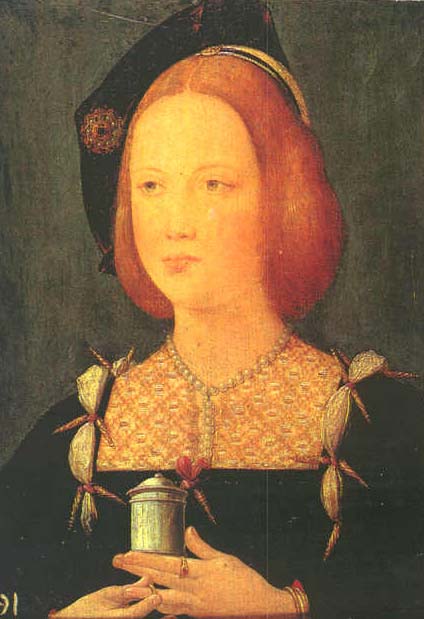
Teenage Wasteland
Princess Mary was the first surviving child of King Henry VIII of England and Catherine, Queen of Aragon. When Mary came into the world, on February 18, 1516, her father welcomed her as “the greatest pearl in the Kingdom.”
As proud as Henry might have been, he rarely showed affection to his daughter. The King was more interested in using Mary as a diplomatic pawn in the complex game of alliances that had engulfed England, France, and the Holy Roman Empire.
When Mary was just two years old, she was betrothed to the Dauphin, or Prince of France, Francis III. This wedding arrangement among two infants was all kinds of inappropriate, and it was intended to secure an alliance between England and France.
Four years later, diplomatic relations between the two kingdoms soured, and the cringe factor escalated. The six-year old Mary was now offered in marriage to her mother’s cousin, the Holy Roman Emperor Charles V, aged 22.
The marriage never took place, but Mother Catherine wanted to ensure that Mary would be raised as a proper Princess, worthy of an Emperor. Mary was tutored by a Spanish teacher, Juan Luis Vives, who outlined her curriculum in the treatise called ‘The Education of a Christian Woman.’
According to Vives, young girls should prepare for a life of humility, self-sacrifice and obedience, in the company of virtuous women. Men, on the other hand, should be avoided. Girls should also restrain the ‘fire of their youth’. It is preferable that they learn instead to weave and spin, which induces a ‘love of sober sadness’.
In other words, Catherine and Vives were raising Mary to become a rather submissive young lady, devoid of spirit and initiative. But Mary had another role model in her household, albeit one who dedicated her little attention: Henry VIII. From him, Mary inherited a love for riding and hunting, and a talent for playing the lute and dancing.
The King started to take notice of these not-so-dainty traits, so in the summer of 1525, he sent the 9-year old Lady Mary to Ludlow castle in the Welsh Marches. This relocation carried great symbolic value — by presiding that court, Mary effectively acted as Princess of Wales, making her a prospect to inherit the throne.
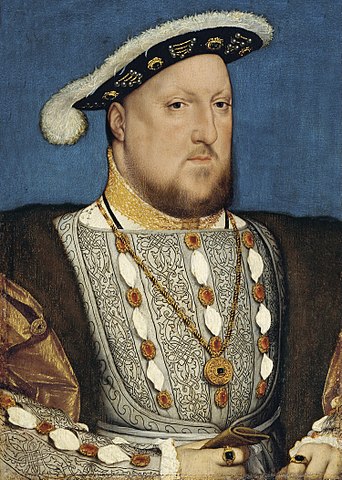
Mary stayed in Ludlow until just after her 11th birthday, when threats of a Welsh rebellion made it safer for her to leave for London. When she returned, Mary was met by a very tense situation. Henry had informed Queen Catherine that he intended to divorce her, as he was having a relationship with Anne Boleyn.
Mary stuck by her grieving mother, trying to console her through that difficult period, from 1527 to 1533.
I won’t go into all the details of the annulment of Henry and Catherine’s marriage today, but one of the best-known consequences was the schism of the Church of England from Catholicism. 10 years after the beginning of the Reformation, a major European court adhered to Protestantism.
From Mary’s perspective, the schism from the Church of Rome had deep personal connotations. Catholicism was her religion as well as her mother’s. Protestantism and the reformation represented the faith of Catherine’s rival, Anne Boleyn, which Henry had opportunistically embraced.
In July of 1533, the 17-year-old Mary was informed that her parents’ marriage had been pronounced invalid and that Henry and Anne were now man and wife.
Mary was also told that she could no longer communicate with her mother. And things went from bad to worse after September 7, 1533 — that is when Anne gave birth to Princess Elizabeth, the future Queen of England. Mary was stripped of her title of princess and ordered to serve as a maid of honour to Elizabeth.
The teenage Mary was moved to a new residence, Hatfield house, to look after her half-sister.
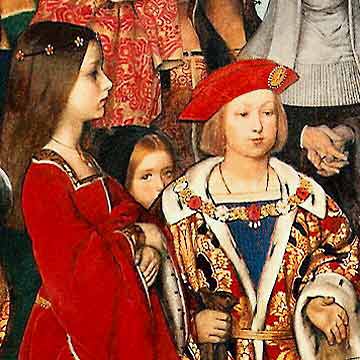
She had been removed from her mother and from her beloved lady-in-waiting, Margaret Pole.
She had been assigned to the worst lodgings in Hatfield, and was routinely humiliated by the members of Elizabeth’s household. Chief among them was Lady Shelton, the aunt of Anne Boleyn.
Any other Cinderella would have accepted her fate as an errand girl while staging musical routines with a bunch of mice.
But Mary fought back with quiet dignity. She always refused to address Elizabeth as ‘Princess’ and feigned deafness if somebody addressed her as ‘Lady’ Mary, rather than ‘Princess’ Mary.
Lady Shelton retaliated by confiscating her clothes and her jewellery, or even by abusing her both verbally and physically. If King Henry came around to visit Elizabeth, Lady Shelton ensured Mary was locked up, preventing her from seeing her father.
But Mary continued with her quiet rebellion. She learned how to exchange secret messages with her mother, with the help of loyal servants. Mary could also count on another ally, the envoy of Charles V to London, Spanish Ambassador Eustace Chapuys. Chapuys became a good friend and made several attempts to intervene on her behalf at court. Alas, all were unsuccessful.
In 1534 the English Parliament ratified the Act of Supremacy, which made the schism from Rome official, and recognised Henry VIII as the head of the Church of England. Mary was supposed to take an oath recognising him as such … but she refused. Accepting the Act of Supremacy meant admitting that Henry and Catherine’s marriage was illegal.
Rejecting such an oath was equal to treason, punishable by death. But Henry, showing mercy, let his daughter live.
At the beginning of February 1535, just before her 19th birthday, Mary fell ill.
She had been suffering for some time from stomach pains, headaches, and depression, but on that occasion her symptoms were worse than ever. Somebody at court even suspected poisoning! Henry had the good idea of sending her away from Hatfield, to recover at the Royal Palace in Greenwich. And recover she did, albeit very slowly.
But barely one year later, Mary received yet another devastating blow. Lady Shelton, without tact or pity, announced that on the 12th of January, 1536, Catherine of Aragon had died.
Beheaded, Died, Divorced, Beheaded, Survived
Mary’s life would only improve when King George VIII grew tired of his new wife. On May 19th, 1536, Anne Boleyn’s graceful neck was struck by the executioner at the Tower of London. She had been executed on trumped up charges of infidelity, incest with her own brother, and conspiracy to kill the King. These accusations had been concocted by the King and his Minister, Thomas Cromwell. There were many reasons behind the execution:
Anne had failed to give birth to a male heir. Or,
Anne opposed an alliance with the Holy Roman Empire, favouring the French. Or,
The King simply wanted to re-marry.
Pick your favourite.
What mattered for Mary is that Henry’s new wife, Jane Seymour, had every intention to build a good relationship with her.
In the summer of 1536, Mary was summoned to court to meet her father for the first time in five years. At the time, she was 20 years old, and Henry had last seen her as a troubled teenager; he was now impressed by an intelligent, confident woman, who had survived years of abuse and neglect with dignity.
During Christmas 1536, the Lady Mary was formally welcomed back at court. For it to happen, she was eventually forced to sign a document, recognising Catherine and Henry’s marriage as unlawful.
Nonetheless, thanks to the family unity created by Queen Jane, Mary enjoyed a newfound happiness. But the days of her benefactor were numbered, because on October 12, 1537, Jane fulfilled Henry’s most persistent wish by giving birth to a son, Edward. Finally, the male heir everybody was hoping for … except, of course, for Mary. Ambitious and intelligent, she knew her best path to the throne would not involve male heirs, older or younger.
The birth of the Prince had another consequence. Jane was confined to bed with a bout of puerperal fever, a fever caused by uterine infection following childbirth. She died 12 days later, on the 24th of October.
King Henry was stricken with heavy grief. He dealt with it in an emotionally mature way — he left England altogether to pursue diplomatic missions. Mary remained at court, further blossoming into a well-liked member of the Royal household. She was a pious young woman, attending Mass every day and offering donations to impoverished members of the clergy.
But she also enjoyed hunting, playing cards and attending shows with jesters.
Foreign Ambassadors started to take note of the young Lady, admiring her intelligence, good nature and good looks. She would have made a perfect bride for some lucky foreign Prince.
Well, in theory.
In practice, her position was ambiguous. Mary was formally an illegitimate child. Remember that document she was forced to sign? Moreover: a potential future groom of Mary’s could lay claims to the throne, threatening the legitimate heir, Prince Edward.
For this reason, King Henry kept several suitors at bay. But of course, he didn’t have any problems with his own ongoing nuptials. In January of 1540, he married Anne of Cleves, before quickly swiping left and tying the knot with Catherine Howard. Catherine’s date of birth is uncertain, but she was for sure younger than her stepdaughter Mary.
Initially, the pious Mary did not get along with dad’s latest trophy wife. But just as the two young ladies were becoming friends, Henry received a letter from the Archbishop of Canterbury, Thomas Cranmer: it accused Catherine of past and present sexual liaisons. Henry announced her treason and had Catherine executed on February 13, 1542.
The following year, Henry married for the sixth time with Catherine Parr, who, like Jane Seymour before her, was able to recreate some degree of family unity.
Mary enjoyed some quiet, happy time, playing with Elizabeth and Edward. She had now grown fond of her much younger half- siblings. But there was a growing cloud over their future, as Henry VIII grew older… what would have happened after the death of the King?
Mary Triumphant
King Henry died on January 28, 1547. His son was crowned as King Edward VI, at nine years of age. Mary withdrew to East Anglia, where she held a sort of parallel court, which always included a Catholic priest, reciting Mass four times a day.
As King Edward and his court continued the path to Protestantism, Mary began to believe that her destiny was to keep the Catholic faith alive in England. This conviction was reinforced by the ambassadors of Charles V, who had every interest in maintaining influence over her cousin.
In 1549, the Act of Uniformity outlawed Catholic Mass, replacing it with services from the Book of Common Prayer. Mary would not comply with the act, as she wrote to Charles V:
“In life or death, I will not forsake the Catholic religion … even if compelled thereto by threats or violence.”
Her personal chaplain was intimidated on orders of Edward Seymour, the Duke of Somerset. This gentleman was the uncle and Lord Protector to young King Edward. Eventually, Seymour proved to be quite lenient, allowing Mary to celebrate the Catholic rites privately.
But Seymour’s tenure as Lord Protector was short-lived, and his successor, John Dudley, Duke of Northumberland, was openly hostile to Mary and Catholicism. He defined her as “The conduit by which the rats of Rome might creep into the stronghold.”
Dudley, and even King Edward, issued intimations to Mary that she stopped celebrating Mass, but she defiantly persisted.

This religious tug-o’-war continued until February 1553, when Mary started hearing rumours about the King’s ill health. The 15-year old Edward VI was, in fact, suffering from severe tuberculosis and he was quickly deteriorating.
This was the beginning of a duel of wits between Mary and John Dudley, with the prize being the Throne of England. Mary considered herself to be the rightful heir to the Crown, while Dudley was ready to sponsor another candidate, in order to prevent a Catholic from becoming Queen. This was Dudley’s daughter-in-law, Lady Jane Grey, who happened to also be the great-granddaughter of the first Tudor King, Henry VII.
At the beginning of July 1553, Mary was in her Hertfordshire residence when she received a summons to Greenwich Palace, to sit by her dying brother. Mary feared this to be a trap from Dudley, and she headed to Norfolk instead, East of London.
When she reached her court in Kenninghall on July 9, she learned that Edward had died three days prior. But the worst piece of news was that Dudley’s son was heading to Norfolk to capture her.
Mary acted quickly and decisively. She pronounced herself rightful Queen of England before her household and sent a message to Dudley ordering him to accept her as Monarch.
Mary’s message reached Dudley just when he was hosting a banquet for Queen Jane Grey. Kind of awkward!
Dudley had reassured Queen Jane and his allies that Mary would be easily tamed and controlled. But Mary would not yield, and she started to amass an army of supporters, recruited from the gentlemen and peasants of East Anglia. Dudley had not been idle, either, sending an army and a fleet to confront Mary – but the odds were quickly turning against him.
By the 16th of July, Mary’s army numbered in the 30,000, and Dudley’s fleet had switched sides.
On the 18th, John Dudley yielded to his new queen.
And on August 3, 1553, Mary Tudor rode triumphantly into London, proclaimed as the new Queen of England. She succeeded the unlucky Lady Jane Grey, Queen of nine days.
Mary the Queen
England welcomed Mary as a rightful heir to the throne. She was, first and foremost, an adult — an intelligent monarch, heavily contrasted against the previous boy king. But nobody knew what to expect from a single Queen as a monarch. The only precedent had been Queen Matilda in the 12th Century, a reign remembered as a chaotic time.
But Mary got off to a good start, making an impression as a virtuous, conscientious, and kind sovereign. Sure, she had Dudley’s head chopped off, even after he had recanted his Protestant faith. But Mary was very lenient towards Dudley’s allies and especially Lady Jane Grey, who received a short sentence to be served at the Tower of London.
The new Queen gave proof of her great tolerance as she had no intention
‘to compel or constrain other men’s consciences’
Straight off the bat, Mary launched a series of much needed reforms.
English finances were in dire condition, after years of malpractice endorsed by Dudley, Edward VI and Henry VIII. Mary’s predecessors had taken to ‘debasing’ the coinage, or lowering the proportion of gold and silver in English circulation. This ‘debasement’ increased cash flow in the economy, but eventually curbed foreign trade. What was the point of trading with England, if the pound was becoming worthless?
Mary revalued the currency and, while she initially intended to curb public spending, she understood the necessity to invest in the military. In particular, she strengthened the defences of the last English possessions in France, Calais, Guisnes and Ham. She also expanded the Navy and incentivised exploration in the New World … a long term programme whose rewards would be reaped by her successors.
But let’s stay in the present.
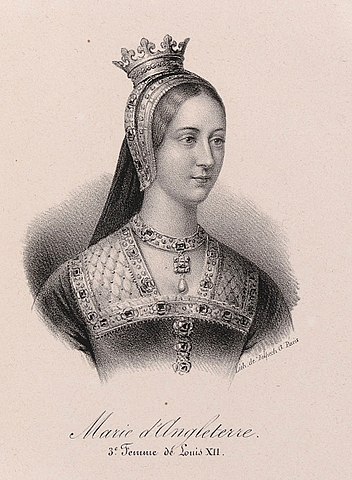
With the crown firmly on her head, the Queen’s councillors and subjects were busy with another question: was Mary intending to marry? If so, when and to whom? Mary had the same question in mind and sought the advice of Charles V. No surprise there, the Habsburg Emperor chose his only son, Philip.
Philip had a reputation for being kind of dull, but on the plus side, he was dignified, serious, eleven years younger than Mary, and fantastically rich. Upon the death of his father, he would contribute two pieces of prime real estate to a potential royal marriage: The Netherlands and Spain.
This is to say that a union between Mary and Philip would have brought together two great powers. However, Mary’s councillors realised that England would have been the junior partner in such an alliance, and England would likely become just another Habsburg dominion. The Protestants within England were also worried about the potential influence of Spanish Catholic clergy.
But Mary had made her mind. She would marry Philip, whom she had seen only once, in a portrait by Titian.
On November 8, 1553, she announced her intention to marry Philip, and in January of 1554, she concluded a marriage treaty with Charles V.
The news was badly received by a group of conspiring noblemen, led by Sir Thomas Wyatt. The plot also involved Henry Grey, father of Lady Jane. The plan called for four separate armies to march into London, seize the court, and replace Mary with her half-sister Elizabeth, set to marry an English nobleman.
The plan, however, reached the ears of the Spanish ambassador, who notified Mary’s main advisor, Lord Chancellor Stephen Gardiner. The rebel alliance of noblemen melted away, but Thomas Wyatt did not back down.
On January 26, 1554, Wyatt and his small army occupied the Kentish town of Rochester, issuing a proclamation against the Queen. Mary sent two contingents to suppress the uprising, but most of those soldiers swapped sides and joined Wyatt. In less than a week he had rallied 4,000 men at his command, ready to march on London.
Mary’s councillors advised her to flee, but the Queen would not have it. On February 1, she delivered a rousing speech to Londoners, rallying their support.
Two days later, Wyatt’s army arrived at the Tower of London, expecting to find little resistance. They were sorely wrong. They found that Mary’s supporters had blocked all bridges and were in control of the artillery atop the Tower. After a failed attempt to outmanoeuvre the defences, Wyatt surrendered.
It was easy to guess the fate of Thomas Wyatt: he and 90 of his co-conspirators were tried and executed. Their bodies were left to rot in the open, as a warning against future rebellions.
The aftermath of the rebellion did not spare two Ladies who may have posed a threat to Queen Mary.
The first was her half-sister, Lady Elizabeth, who had been approached by Wyatt and friends to join their uprising. But during a hearing with Mary’s councillors, Elizabeth managed to distance herself from the plot. Mary realised that Elizabeth may still become a rallying figure for Protestant schemes, and so she put her under house arrest for one year.
The second Lady was former Queen Jane Grey, and she did not get away so luckily. Her father Henry had been one of the rebels, and she still carried legitimate claims to the throne. On the February 12, 1554, Lady Jane Grey was beheaded in the Tower of London.
With the anti-Spanish and anti-Catholic conspirators out of the way, Mary was free to marry Philip – albeit with some clauses added to the marriage treaty, which became a sort of ‘ultimate pre-nup’.
It now stipulated that Philip would be King of England only for the duration of the marriage, and he would be unable to issue any proclamations or treaties. He could not appoint any foreigners to the English council, and he could not demand England to support Spain in acts of war.
On July 25, 1554, the marriage of Mary and Philip, of England and Spain, finally took place. It seems that from the start, the union was not a happy one. Philip complained about the ‘old age’ of Mary, and his courtiers described her as
‘not at all beautiful … small and rather flabby … and has no eye-brows.’
Philip showed little affection for his bride, avoiding her most of the time. And yet, in October of 1554, Mary announced her pregnancy. In April of 1555, the Queen moved to Hampton Court, visibly pregnant and preparing for the birth.
But the days, and the weeks passed … and nothing happened. Members of Mary’s household began noticing that her belly was becoming flatter again. Eventually, Mary and her doctors had to admit the truth: they had all been mistaken and the Queen had never actually been pregnant.
How was that possible? After all, she had displayed all the signs of pregnancy, including the ceasing of her periods, swollen stomach, and discharge of milk. It may be that Mary suffered from amenorrhoea, a condition which causes painful and irregular periods and swelling of the abdomen and the breasts.
Other hypotheses include a disorder of the pituitary gland, a uterine cancer or even a ‘phantom pregnancy’ – a deep-rooted belief of expecting a child which generated psychosomatic symptoms. Whatever the underlying cause, by August all symptoms had subsided, and Mary left Hampton Court, as quietly as possible.
Mary the Bloody
While Mary was coping with her apparent pregnancy, one of her most trusted councillors was hard at work on religious matters. This was the new Archbishop of Canterbury, Cardinal Reginald Pole, son of Mary’s former lady-in-waiting.
Cardinal Pole oversaw Mary’s counter-reformation, which culminated on November 25, 1554. On that date, Parliament repealed Henry VIII’s Act of Supremacy and effectively reinstated the Catholic faith in England.
Three weeks later, Pole and the Parliament revived the medieval heresy laws. These granted to Bishops the right to identify heresy suspects and hand them over to secular authorities – for trial, for torture, and very often for execution by burning at the stake.
With the legal framework in place, Mary urged the authorities to be diligent in seeking out heresy and punishing it with death. The first executions took place in February of 1555. Initially the flames consumed the bodies of Protestant clergymen, such as John Hooper, Bishop of Gloucester.
The executioners had placed a bag of gunpowder around his neck to accelerate combustion. As bad as it sounds, this was an act of mercy. But the gunpowder failed to ignite, and the Bishop’s agony protracted for 45 minutes.
More high-ranking clergymen followed Hooper’s fate, including Archbishop Thomas Cranmer. He had led the Protestant Reformation under Edward VI but had later denied his beliefs when Mary had ascended to the throne. On the day of his execution, Cranmer plunged his hand into the flames, as a self-punishment for his early recantation.
Besides these high-profile martyrs, most victims were commoners, poor traders and labourers. Some of them had been reported as heretics simply for not being able to recite the Lord’s Prayer. In one particularly horrific execution, a pregnant woman was tied to the stake. As her body was consumed by flames, she gave birth to an unfortunate child, who was tossed, too, onto the raging fire.
What had happened to Mary? She had started her reign as a fair and compassionate ruler. She had executed Dudley, Wyatt and his acolytes, sure … but that was the standard punishment for high treason.
It has been argued that Mary believed she was fulfilling her destiny by restoring England to the true faith. To save her subjects from the eternal flames of Hell, she believed it was an acceptable price to pay if some of them died at the stake.
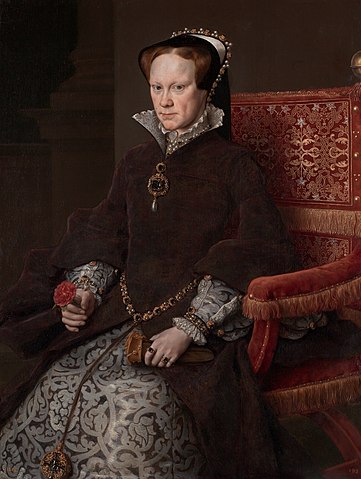
The Marian Persecutions caused the death of about 300 English subjects and eventually, umm… backfired.
Mary’s bloodthirst caused many loyal subjects to turn away from her and Catholicism. By the end of 1555 Mary had realised that her actions had only succeeded in expanding the cohorts of her enemies, as she wrote to Philip.
Her husband, by the way, was no longer by her side. After the revelation of a false pregnancy, he had relocated to the Netherlands, where he enjoyed a life of jousting and womanising.
In the Autumn of 1556, the Queen found out that Philip would be returning, and she was delighted.
But Philip’s return was not for the sake of a family reunion. The man even brought his mistress to London! No, Philip, by now King of Spain, was planning a war with France, and he needed England’s support.
King Philip arrived in March of 1557 and Mary, anxious to please her husband, succumbed to his pressure. Despite the council’s protests, she promised English support for his war with France.
Philip’s campaign in France was short and successful. In August, he captured St Quentin, taking many French aristocrats as hostages. Philip scored other minor victories, until French King Henry II sued for peace.
In October 1557, Philip left France and disbanded his Anglo-Spanish forces, but Henry was already plotting revenge. His target was Calais, jewel of the English crown on French land.
In December, the French attacked. Approaching over the frozen marches, Henry’s soldiers laid siege to the city. Mary responded by dispatching a fleet from Dover, but the ships arrived too late. By the 13th of January 1558, French artillery had breached the walls of Calais and the city had fallen. Guîsnes and Ham were also conquered by Henry: Mary had lost all of England’s holdings in France, her last foothold on the continent.
The fall of Calais was a devastating blow for Mary, but it was somewhat softened by the realisation that she was pregnant. She waited until December of 1558 to notify Philip, reassuring him that this time it was for real.
Except… it wasn’t.
The baby was due in March, but by May no child had been born. It appeared that Mary’s distended belly was the sign of a fatal case of ‘dropsy’ — the accumulation of fluid under the skin, which may lead to kidney failure.
In June, the Queen became feverish. By August, her doctors predicted that death was inevitable. Queen Mary Tudor finally died on the morning of November 17, 1558, at the age of 42.
Shortly before her death, she had made the prediction that those who opened her body would find the words ‘Philip’ and ‘Calais’ carved onto her heart.
During her short, five-year reign, Mary Tudor was beset with personal and political disappointments, well summarised by the two words supposedly inscribed on her heart. She did initiate some important reforms, which set the stage for a stronger England to become a sea power. The skill and resilience she displayed before becoming Queen are remarkable.
It is undeniable, nonetheless, that the persecutions Mary instigated are one of the darkest pages in English history. Mary is remembered for an unjust and unjustified repression of religious expression, which eventually turned against her.
Yet, a certain Queen who came after her had 640 people executed, 190 of them for religious reasons. But we remember her as ‘Gloriana’.
And a certain Crusader King who came before her ordered 2,000 prisoners beheaded in the Holy Land, simply because he grew impatient with negotiations. But we remember him as ‘Lionheart.’
I am not suggesting that Mary’s reign should not be remembered as ‘Bloody’ … but is it fair to single her out as such? Or would it be fair to reassess her legacy? I am looking forward to hearing your verdict in the comments. And as usual … thank you for watching.
LINKS AND SOURCES
Biographies of Mary Tudor:
https://www.scribd.com/article/444649242
https://www.scribd.com/book/238628089
https://www.scribd.com/book/370813762
https://www.historyextra.com/period/tudor/mary-i-the-forgotten-trailblazer/
The Act of Supremacy, 1534: https://www.parliament.uk/about/living-heritage/transformingsociety/private-lives/religion/collections/common-prayer/act-of-supremacy/#:~:text=Description%20%3A,severing%20ecclesiastical%20links%20with%20Rome.
Protestant Reformation:
https://www.britannica.com/event/Reformation
Execution of Anne Boleyn: https://www.historyextra.com/period/tudor/anne-boleyn-death-execution-where-buried-how-die/#:~:text=Anne%20Boleyn%2C%20Henry%20VIII’s%20second,years%20old%20at%20the%20time.
Death of Jane Seymour
https://www.historyextra.com/period/tudor/kings-and-queens-in-profile-jane-seymour/
Puerperal fever
https://www.lexico.com/definition/puerperal_fever
Catherine Howard
Lady Jane Grey
http://www.bbc.co.uk/history/historic_figures/grey_lady_jane.shtml
John Dudley
https://www.tudorsociety.com/22-august-1553-execution-john-dudley-duke-northumberland/
Elizabeth I’s death toll:
https://historycollection.com/seven-bloodiest-queens/6/



